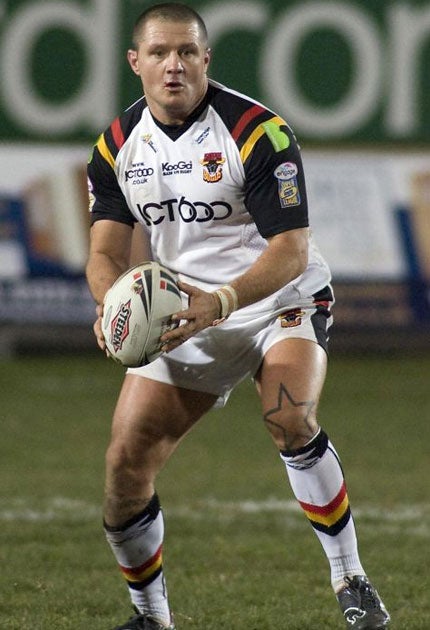Terry Newton: Rugby league scrum-half who took his own life following his suspension for drug-taking

Terry Newton was a richly talented and fiercely competitive rugby league player who will be remembered for the wrong reasons. His suicide at the age of 31 was the final act in a life and a career that often verged on melodrama.
Newton was brought up on the Worsley Mesnes estate in Wigan and gravitated to the game from an early age with the local amateur clubs Wigan St Jude's and Orrell St James. He was a prop forward who made up for his lack of size with sheer enthusiasm and aggression. He made the England Schoolboys side, but Wigan considered him too small and overlooked him.
Instead, he signed for Warrington, but in a way that presaged a career that was rarely simple, later signed for Leeds as well. That prompted a tug-of-war between the clubs, during which he could play for neither of them. After he spent a year out of the game, the case was resolved in Leeds' favour.
Leeds began the process of turning him into a hooker, a role in the modern game for which he proved to be ideally suited. He made his first-team debut against Sheffield Eagles in 1996 and toured New Zealand with the Great Britain Academy side at the end of that season and played in the World Club Challenge on both sides of the world the following season.
In 1998 he broke his leg twice, was loaned out to Bramley, played in the first Super League Grand Final, which Leeds lost to Wigan, and made his Great Britain debut. It was, as he described it in his autobiography Coming Clean, published this year, a typically eventful Terry Newton season. The following year, he was a Challenge Cup winner with the Rhinos, as the London Broncos were thrashed in the last final at the old Wembley Stadium.
Equally satisfying for Newton was the way that Wigan approached him, through an agent, about playing for them. "My mind was made up before I'd walked into the meeting," he said. "All I'd wanted since I was seven was to play for Wigan."
The deal was done for a £145,000 transfer fee, and Newton went on to make 186 appearances, scoring 62 tries, a remarkable number for a hooker. On top of his obvious relish for the physical aspects of the game, he had become an inventive player who could make things happen near the opposition try-line. During his time there, he played in three losing Grand Finals. Far more traumatic than that was the loss of his sister, Leanne, who died after a battle with heroin addiction.
Newton always attracted more than his share of trouble, both on and off the pitch, most infamously in the derby against St Helens in 2005. Saints' Lee Gilmour was carried off after Newton's high tackle on him, but it was the tackle that broke Sean Long's cheekbone and eye socket with his elbow that was one of the defining moments of his career. Ironically, in the close-knit world of rugby league, Long had been a close mate since they grew up together in Worsley Mesnes.
Newton was suspended for 10 matches and his Wigan career was effectively over. Again, typically, there was nothing straightforward about his transfer to Bradford. Wigan wanted Mickey Higham, but would not do business with his club, St Helens. Instead, Higham was transferred to Bradford, but was swapped for Newton without playing a game.
Newton had four good seasons with the Bulls but the side had started its slow decline and won nothing during his time there. He made the last of his 15 Great Britain appearances in 2007. At the end of the 2009 season he signed for Wakefield, but was to make just two appearances for them before his turbulent career shuddered to a halt.
Earlier that year he had started taking human growth hormone to speed up the recovery from injuries, injecting himself in his garage in a desperate attempt to roll back the years. He had been told that it was undetectable, but in November drug-testers turned up at a Wakefield training session and took a blood sample. Last February he was told that he had tested positive for HGH, the first athlete in the world to do so. He was given the mandatory two-year suspension and his contract at Wakefield was cancelled.
At 31, Newton knew his Super League career was over, though he harboured hopes that helping the UK Anti-Doping Agency in its campaign against the drug – stopping short of naming names – might shorten his ban and allow him to play again at a lower level.
He began to run a pub in Wigan, where many of his old team-mates and opponents visited and found him superficially cheerful. Despite his various excesses, he had always been a popular character within the game. He was hard on himself, however, calling himself a cheat and reflecting that he would be remembered for two things – taking drugs and smashing Sean Long's cheekbone.
As crowds gathered at the Championship Finals at Warrington last Sunday, rumours began to circulate that Newton had been found hanged in his garage. There was a minute's silence in his memory at the Man of Steel ceremony this week and there will be another at the Super League Grand Final at Old Trafford on Saturday.
That will mark the passing of a player who, despite his own assessment, deserved to be remembered for his ability, courage and wholeheartedness as well as the things he did wrong.
Terry Newton, rugby league player: born Wigan 7 November 1978; married Stacey (two daughters); died Orrell 26 September 2010.
Subscribe to Independent Premium to bookmark this article
Want to bookmark your favourite articles and stories to read or reference later? Start your Independent Premium subscription today.

Join our commenting forum
Join thought-provoking conversations, follow other Independent readers and see their replies